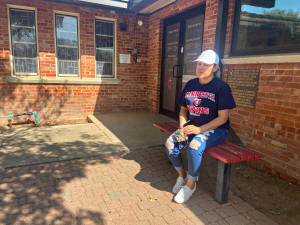Desperate Americans hit by pandemic beg Congress, Trump to pass economic
relief bill
 Send a link to a friend
Send a link to a friend
 [October 13, 2020]
By Brad Brooks, Mimi Dwyer and Rich McKay [October 13, 2020]
By Brad Brooks, Mimi Dwyer and Rich McKay
(Reuters) - Sylvia Padilla spent last
Thursday checking food pantries in Lubbock, Texas for groceries to feed
herself, her daughter and three-year-old grandson.
Some places were closed, others had nothing available. Outside the
shuttered St. John's United Methodist Church, Padilla, 50, recounted her
struggle to survive during the economic disaster that the novel
coronavirus pandemic had dumped upon her, choking words out through
tears of fear and frustration.
"This is like a nightmare I can't wake up from," Padilla said, resting
her face in her hands. "It really feels like a nightmare, but it's our
reality."
Like many Americans, Padilla is barely getting by and says she
desperately needs government help. She received a $1,200 check in April
from the Coronavirus Aid, Relief and Economic Security Act passed by the
U.S. Congress and signed by President Donald Trump on March 27.
The check helped her pay back rent she owed and she and others are
hoping that lawmakers and the Trump administration can reach accord soon
on another relief package after months of disagreements.
"We've got some potatoes and beans at home. A bit of flour for
tortillas. We're just trying to make that stretch," said Padilla, whose
business selling food to construction workers ended with the pandemic
and her daughter last month lost her job in retail sales.

"A new stimulus check would really mean the world to me right now."
After March's shutdowns to curb the spread of the virus, unemployment in
the United States shot to levels not seen since the Great
Depression. Many jobs returned as parts of the economy reopened, and
consumer spending rebounded, thanks in part to the $2.2 trillion
stimulus bill.
Now that cash, paid directly to individual Americans and small
businesses to pay workers, has dried up. Long-term unemployment is
climbing because entertainment and travel industries are starting to
permanently lay off furloughed workers.
Republicans and Democrats in Congress, where members' median wealth is
over $1 million, have been unable to agree on how much new cash
the federal government should give out, who it should go to, or how any
new bill should combat the virus that has killed more people in
the United States than any other country.
In the space of a few days last week, Republican Trump abruptly called
off talks until after the Nov. 3 election in which he is seeking
re-election, then urged his team on Twitter to "go big" and then on
Friday offered a $1.8 trillion package, closer to the Democrats' $2.2
trillion proposal.
Without a new stimulus bill, the U.S. economy will "stall" in the fourth
quarter of the year, Oxford Economics said, putting the country in a
"perilous situation."
LIVING IN LIMBO
Padilla and others are already in a perilous situation.
Emma Bijil in Chicago has been forced to go to a food pantry for the
past few months after being laid off from a health care job. She is
pregnant and struggling to keep herself and three daughters fed.
"I have to do what I have to do to survive," said Bijil, 37, as she sat
in her car, waiting to pick up some groceries. "I've never been to a
food pantry before, but as long as my children are fine, I will eat a
rat's ass if I have to."
The $1,200 government check helped with one month of rent, but she said
government assistance needs to be much more substantial and last longer.
"We need help," she said. "There has to be a way out."
Others are finding themselves in an uneasy limbo, hoping their former
life will return, but with no clear idea when that could be.
[to top of second column]
|

Sylvia Padilla poses for a photo outside St. John’s United Methodist
Church in Lubbock, Texas, U.S. on October 8, 2020. REUTERS/Brad
Brooks

When Leo Valladares, 25, got furloughed from his job as an American
Airlines flight attendant on Oct. 1, the first thing he had to
figure out was where to live.
He’d been stationed in Miami for the past six months and wanted out,
but not home to Texas where his mom had just lost her job and health
insurance. "I had been exposed so much," to the virus, he explained.
So he flew to Chicago, where he’d lived before and where American
had agreed to transfer him, and moved full-time into a "crash pad"
where flight attendants often stay during days off. He’d saved
$9,000 over the summer after American warned employees they might be
furloughed.
Now, for $350 a month, he rents a bunk bed in a giant house where 20
of his colleagues sometimes pass through. He's applied to jobs at
McDonald’s, WinCo Foods, Best Buy, and elsewhere, and been told he
is both over- and under-qualified.
Valladares calculates his savings might last six months, if he walks
everywhere instead of spending three dollars on bus fare and buys
frozen chicken drumsticks in bulk and apportions them out weekly.
LASAGNA SALES DISAPPEAR
Donald Harper, 55, once a sought-after chef for the hotel
restaurants that catered to visitors at Florida's Disney World,
Universal Studios and other parks, saw his clients and his paycheck
vanish when the pandemic shuttered hotels and parks.
His signature four meat and six cheese lasagna made him popular
among hoteliers' kitchens, and helped earn him about $4,800 every
two weeks - "not bad for a working man" as Harper says.
But now Harper scrambles to pay rent in Orlando and have groceries
for himself and his nine children.
"I have to say no to the kids a lot, it aches my heart," he said.
"All their friends have the online video thing 'Fortnite,' I have to
say no" because the online pass is too much.
Harper said he drew $275 a week in unemployment insurance "plus
whatever I can hustle with cake and cupcakes on the side."
He operates out of his small home kitchen.
Late last Friday he was finishing up a 5-tiered wedding cake - a
confection stacked with layers of blue velvet, red velvet and orange
cream, his specialty.

"I've paid decades worth of taxes, it's time the government turned
it back and help the people," Harper said.
"If I could, I'd say Mr. President, people are hurting right now. My
family is hurting. There's no more time to play around. We need your
help."
(Reporting by Brad Brooks in Lubbock, Texas, Mimi Dwyer in Los
Angeles, Rick McKay in Atlanta and Brendan O'Brien in Chicago.
Editing by Heather Timmons and Grant McCool)
[© 2020 Thomson Reuters. All rights
reserved.] Copyright 2020 Reuters. All rights reserved. This material may not be published,
broadcast, rewritten or redistributed.
Thompson Reuters is solely responsible for this content. |